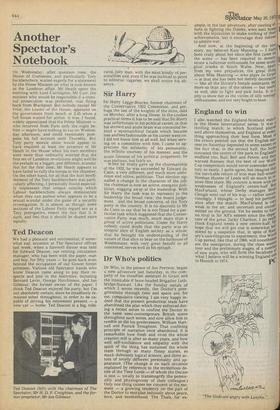Sir Harry
Sir Harry Legge-Bourke, former chairman of the Conservative 1922 Committee, and perhaps the last of the knights of the shire, died on Monday, after a long illness. In the crudest practical terms it has to be said that Sir Harry was unfortunate in his political career, in that his shrewd and acute brain was concealed behind a squirearchical facade which became less and less fashionable as his career went on. I did not know him at all well, but when serving on a committee with him, I came to appreciate the solidarity of his personality, the infinite courtesy of his manner, and the acute fairness of his political judgement: he was partisan, but fairly so.
when Sir Harry gave up the chairmanship of the 1922, he was succeeded by Edward du Cann, a very different, and much more ambitious and active, politician. That election signalled a change in the character of the job: the chairman is now an active, energetic politician, nagging away at the leadership. With Sir Harry the task was to represent to the leadership the broad view, the board judgement, and the broad concerns, of the Tory party in the country. It is no discredit to Mr du Cann to say that he is not fitted for a particular .task which Suggested that the Conservative Party was much, much more than a group of active politicians. Under Sir Harry nobody could doubt that the party was an integral slice of English society as a whole: that he brought his understanding of • the nature of that slice to bear on the hothouse of Westminster, with very great benefit to all concerned, serves well as his epitaph.


































 Previous page
Previous page